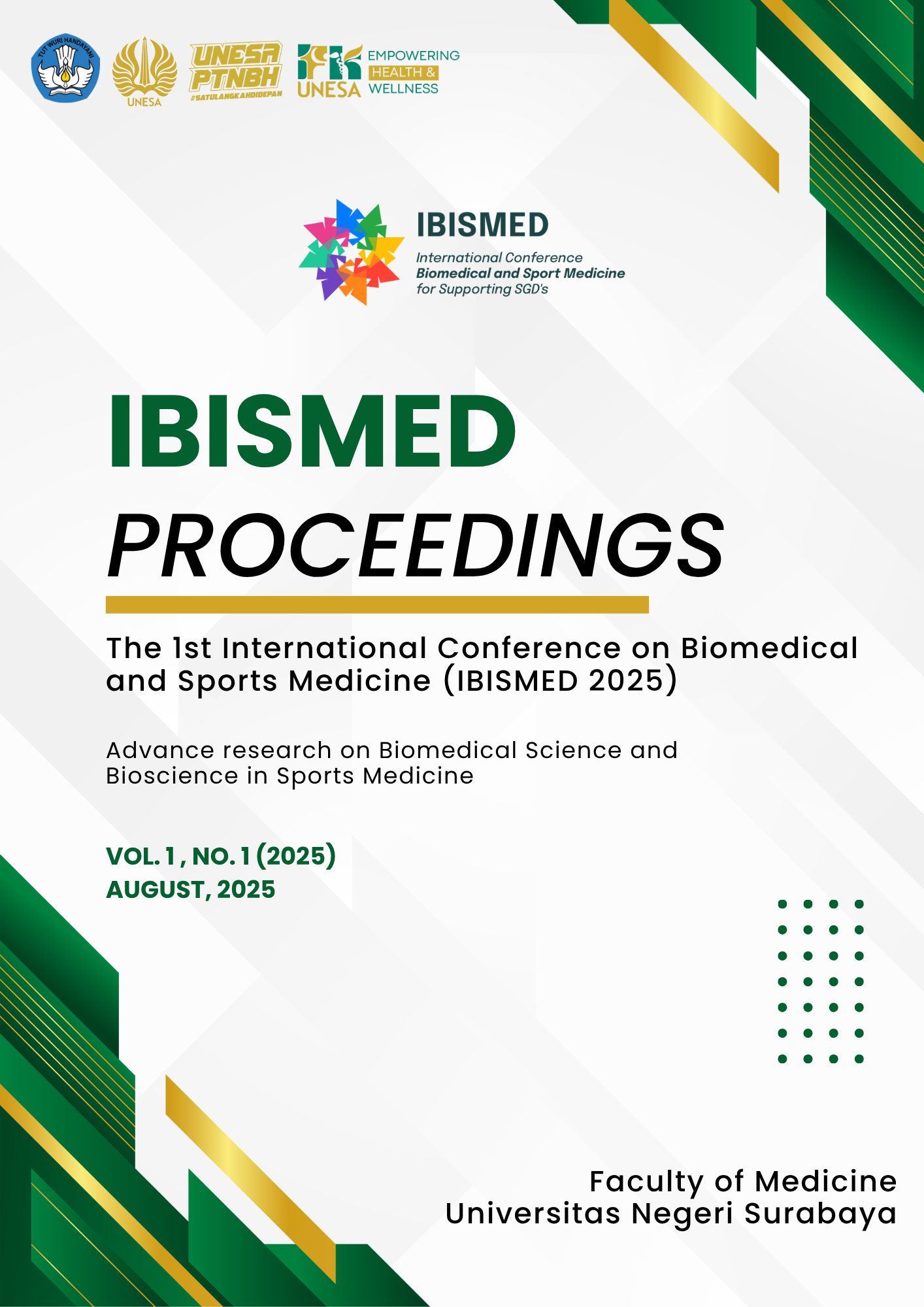The Role of Physical Exercise in Promoting Active Living and Psychological Well-Being in Older Adults: A Literature Review
Keywords:
Physical Exercise, Older Adult, Active-Living, Physichological Well-BeingAbstract
Aging leads to physiological and psychological decline, reducing older adults’ quality of life. Physical exercise is recognized as a non-pharmacological intervention to maintain their health and independence. This study employed a literature review method by analyzing ten articles from 2020–2025 focused on physical exercise among individuals aged 60 and above. The findings reveal that regular physical activity improves balance, strength, mobility, and reduces insomnia, stress, and depression. Myokines released during exercise enhance anti-inflammatory and neuroprotective functions. Further analysis showed cognitive improvement, especially when combined with Brain Endurance Training, which strengthens executive function and mental resilience. Discussion of various research designs—randomized controlled trials, systematic reviews, and observational studies—supports that structured and consistent physical exercise can substitute or complement pharmacological therapy with fewer side effects. In conclusion, physical exercise is a safe, accessible, and cost-effective strategy to enhance physical, psychological, and cognitive well-being in the elderly. This study encourages the implementation of supervised exercise programs in both clinical and community settings to support healthy and active aging.
Downloads
References
Buriticá-Marín, E. D., Daza-Arana, J. E., Jaramillo-Losada, J., Riascos-Zuñiga, A. R., & Ordoñez-Mora, L. T. (2023). Effects of a Physical Exercise Program on the Physical Capacities of Older Adults: A Quasi-Experimental Study. Clinical Interventions in Aging, 18(February), 273–282. https://doi.org/10.2147/CIA.S388052
Díaz-García, J., García-Calvo, T., & Ring, C. (2025). Brain endurance training improves sedentary older adults’ cognitive and physical performance when fresh and fatigued. Psychology of Sport and Exercise, 76(October 2024). https://doi.org/10.1016/j.psychsport.2024.102757
Flint, B., & Tadi, P. (2023). Physiology, Aging. StatPearls. https://www.ncbi.nlm.nih.gov/books/NBK556106/
Kusmaedi, N. (2020). The Effect of Sport Activity on the Elderly Health-Related Physical Fitness. 21(Icsshpe 2019), 195–198. https://doi.org/10.2991/ahsr.k.200214.052
Kwon, J. H., Moon, K. M., & Min, K. W. (2020). Exercise-induced myokines can explain the importance of physical activity in the elderly: An overview. Healthcare (Switzerland), 8(4). https://doi.org/10.3390/healthcare8040378
Li, X., Wang, P., Jiang, Y., Yang, Y., Wang, F., Yan, F., Li, M., Peng, W., & Wang, Y. (2024). Physical activity and health-related quality of life in older adults: depression as a mediator. BMC Geriatrics, 24(1), 1–10. https://doi.org/10.1186/s12877-023-04452-6
López-Torres Hidalgo, J., Sotos, J. R., Salmerón, L. A., Gras, C. B., Rosa, M. C., Escobar Rabadán, F., Vizcaíno, C. E., Belenguer, J. L. E., Martín, J. F., López, V. F., García, A. L., López, J. L. T., López, J. L. T., Verdejo, M. Á. L., Yeste, A. L., Callejo, M. Á. L., Lozano, M. J. M., Núñez, J. M., Rodríguez, K. N., … Lapeira, J. M. T. (2021). Effectiveness of physical exercise in older adults with mild to moderate depression. Annals of Family Medicine, 19(4), 302–309. https://doi.org/10.1370/afm.2670
Prahasasgita, M. S., & Lestari, M. D. (2023). Stimulasi Fungsi Kognitif Pada Lanjut Usia Di Indonesia: Tinjauan Literatur. Buletin Psikologi, 31(2), 247. https://doi.org/10.22146/buletinpsikologi.80371
Rodrigues, S. L. da S., da Silva, J. M., de Oliveira, M. C. C., de Santana, C. M. F., Carvalho, K. M., & Barbosa, B. J. A. P. (2023). Physical exercise as a non-pharmacological strategy for reducing behavioral and psychological symptoms in elderly with mild cognitive impairment and dementia: a systematic review of randomized clinical trials. Arquivos de Neuro-Psiquiatria, 79(12), 1129–1137. https://doi.org/10.1590/0004-282X-ANP-2020-0539
Saputra, R., & Budayati, E. S. (2024). The Influence of Exercise On the Health of the Elderly. International Journal of Multidisciplinary Research and Analysis, 07(02), 761–765. https://doi.org/10.47191/ijmra/v7-i02-43
Sehn, L. F. B., Stigger, F. de S., Schuch, F. B., & Firth, J. (2020). Effects of physical exercise on cognitive function of older adults with mild cognitive impairment: A systematic review and meta-analysis. Archives of Gerontology and Geriatrics, 89, 104048. https://doi.org/10.1016/j.archger.2020.104048
Susanto, A. F., Wijaya, A., & Roni, F. (2020). Hubungan aktivitas fisik dengan kualitas tidur pada lanut usia. Jurnal Edu Nursing, 3(1), 1–11.
Valenzuela, P. L., Saco-Ledo, G., Morales, J. S., Gallardo-Gómez, D., Morales-Palomo, F., López-Ortiz, S., Rivas-Baeza, B., Castillo-García, A., Jiménez-Pavón, D., Santos-Lozano, A., del Pozo Cruz, B., & Lucia, A. (2023). Effects of physical exercise on physical function in older adults in residential care: a systematic review and network meta-analysis of randomised controlled trials. The Lancet Healthy Longevity, 4(6), e247–e256. https://doi.org/10.1016/S2666-7568(23)00057-0
Downloads
Published
How to Cite
Issue
Section
License
Copyright (c) 2025 Caturia Sasti Sulistyana, Henry Java Perwira, Vika Ishmaturroziqoh, Nur Florenty Rehulina Ginting, Nadira Silmi Sabila

This work is licensed under a Creative Commons Attribution-NonCommercial 4.0 International License.
 Abstract views: 55
,
Abstract views: 55
, PDF Downloads: 73
PDF Downloads: 73


